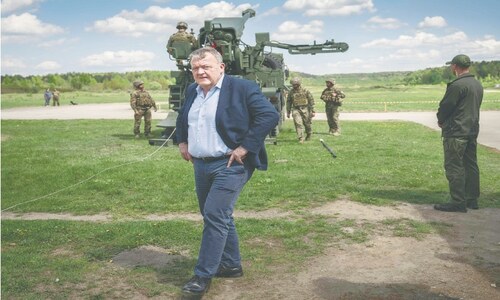BEIJING: China’s ruling Communist Party on Wednesday elevated five new officials to assist President Xi Jinping as he embarks on a second five-year term, and by stopping short of designating an obvious successor strengthened his position as the country’s most powerful leader in decades.
As expected, Xi was given a renewed mandate following the first meeting on Wednesday of the new Central Committee that was elected at the party’s twice-a-decade national congress.
“We will mobilise the whole party and the whole country in a resolute push to deliver on our pledge and eradicate poverty in China,” Xi, China’s president, said in comments to reporters at a brief ceremony at the Great Hall of the People.
The new leaders will face challenges that include reining burgeoning levels of debt, managing trade tensions with the US and Europe, preventing war over North Korea’s nuclear programme and navigating ties with Southeast Asian nations wary of Beijing’s influence.
Five members of the new seven-strong Politburo Standing Committee introduced by Xi were newly appointed on Wednesday. Going by the party’s norms on retirement ages, none of them are deemed suitable to succeed the 64-year-old Xi as party leader after his second five-year term.
The absence of an obvious successor pointed to Xi’s longer-term ambitions, said Joseph Fewsmith, an expert on Chinese politics at Boston University.
“It suggests that Xi will likely serve a third term, and that he is likely to name his own successor,” Fewsmith said. “We have not seen that for two decades.”
In contrast, before Xi took power in 2012, he had been in the Standing Committee for five years. Xi’s predecessor, Hu Jintao, had a seat in the body for 10 years before becoming party leader. Under recent party precedent, party leaders have served just two five-year terms.
The party had already elevated Xi’s status on Tuesday at its closing session by inserting his name and dogma into the party’s constitution alongside past leaders Mao Zedong and Deng Xiaoping.
“No one doubts Xi bestrides the landscape like a colossus. Organised or even unorganised resistance is inconceivable,” said Jeremy Paltiel, a China expert at Canada’s Carleton University.
Xi, the son of a Communist elder, has described his political ideology as central to setting China on the path to becoming a “great modern socialist country” by midcentury. This vision has at its core a ruling party that serves as the vanguard for everything from defending national security to providing moral guidance to ordinary Chinese.
The only other returning member to the apex ruling body was Premier Li Keqiang, the party’s second-ranking official primarily responsible for overseeing the economy and leading the Cabinet. Li’s authority was widely viewed as having been undercut by Xi’s accumulation of power across various sectors of government.
The makeup of the committee reflects Xi’s efforts to foster party unity by striking a balance between different interest groups in the 89-million member organisation. They will run the rubber-stamp legislature and its advisory body and be responsible for areas that include propaganda, party discipline and ethnic and Taiwan affairs.
The inclusion of politicians from factions associated with Xi’s predecessors Hu and Jiang Zemin in the Politburo Standing Committee pointed to the party’s efforts to assuage concerns that Xi has been centralising too much authority under him alone, analysts said.
“It signals balance and offers some relief to those who thought Xi will seek to place just his own loyal followers in key positions,” said Dali Yang, a China politics expert at the University of Chicago.
The five new members are, in order of seniority: Li Zhanshu, who serves as Xi’s chief of staff; Vice Premier Wang Yang; Wang Huning, director of the party’s Central Policy Research Office; Zhao Leji, head of party organisation responsible for job assignments; and Shanghai party leader Han Zheng, a veteran manager of the country’s financial hub.
Among the five, only Zhao and Li are seen to be Xi’s protégés.
Published in Dawn, October 26th, 2017
















































